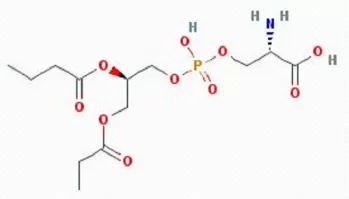Hepibel, capsules with vitamin B5 and phosphatidylserine
Approved health claims:
Vitamin B5 contributes to normal mental functioning, normal mental abilities, memory, attention, concentration and recall.
Neurophysiological and biochemical facts about phosphatidylserine:
Phosphatidylserine is a phospholipid component of the membrane that surrounds each of our brain cells.
Phosphatidyllysirine helps maintain the fluidity and permeability of brain cells. It allows the efficient transport of proteins, enzymes, nutrients, oxygen and glucose into and out of each cell. Phosphatidylserine is involved in the generation and transmission of signals within neurons and in chemical signalling that takes place across nerve synapses. Phosphatidylserine stimulates healthy nerve growth factor (NGF) and supports neurogenesis necessary for long-term potentiation (LTP), on which memory formation depends.
Phosphatidylserine is involved in the building of mitochondria, which are the energy centres of every brain cell.
Phosphatidylserine is undoubtedly one of the most effective and important nootropics available today. It keeps our brain cells healthy. It has a reputation for improving alertness, attention, cognition, memory, recall and normal levels of neurotransmitters associated with emotions.
Functions of phosphatidylserine:
• Neuro-optimization:
Phosphatidylserine keeps brain cells fluid and permeable. This neuroplasticity helps neurons form new connections needed to form memories. It is an integral part of cleaning damaged neurons and maintaining an optimised brain, and it stimulates mental energy by allowing the flow of glucose and oxygen needed to nourish brain cells.
• Neurotransmitters:
Phosphatidylserine is an integral part of the flow of key neurotransmitters such as dopamine and acetylcholine. Phospholipids contain choline, which is a precursor of acetylcholine (ACh). Thus, it will increase the level of ACh in your brain. They affect cognition, memory and emotions.
• Neurogenesis:
Phosphatidylserine works together with DHA and omega-3 to keep brain cells optimised. It prolongs the survival and health of neurons Phosphatidylcholine (PC) is the most abundant phospholipid in the brain. It is followed by a smaller amount of phosphatidylserine (PS).

Phosphatidylserine supports the generation and transmission of neuronal signals within neurons and through synaptic connections that link one neuron to another. This cellular communication is how we form memories. Phosphatidylserine also helps nerve growth factor (NGF), which ensures healthy neurogenesis, and even helps build mitochondria, which are the source of energy in each of our brain cells.
When our brain cell membranes are healthy, they are flexible, fluid and resilient. But when we reach our twenties, phospholipids, including phosphatidylserine (PS), start to decline. This case is beginning to harden. Attention, concentration, memory, mood and learning start to decline.
The good news is that we can prevent this cell damage from occurring. The amount and type of long-chain fatty acids in our diet affect the composition of these cell membranes.
The structure and function of our cells depend on an ideal balance of fats, including cholesterol, oleic, palmitic and stearic fatty acids, and essential fatty acids such as omega 3. Without this correct balance, cell membrane function is compromised.
Our typical modern diet does not provide the ideal balance of fatty acids (phospholipids) to maintain brain cell health. As a result, we experience brain fog, memory loss, slow thinking and poor decision-making. Phosphatidylserine is a fat-soluble derivative of an amino acid found in large quantities in the brain, where it contributes most to the function of reasoning (cognition).
